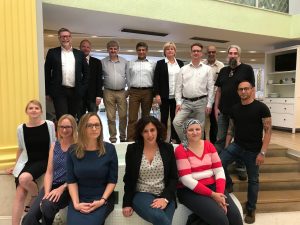Accompanying European SMEs on their Open Innovation Journeys

Within INSPIRE (standing for Integrated Support of oPen Innovation pRofessionalization initiative), a Coordination and Support Action funded by the European Commission under H2020, we have investigated in depth Open Innovation (0I) practices in SMEs across Europe with a view to distilling lessons about how to improve the supply chain and deploy a dedicated support package.
Starting from 300+ OI good practices documented in the first stage of the study, we have analysed the open innovation journeys of 120 interesting cases (those that have the greatest learning potential) identifying barriers, critical factors, lessons learnt, needs/expectations.
“There are several definitions of OI; to keep it friendly for our target users, we adopted the following:  Open Innovation is the practice that companies engage in to acquire external knowledge or collaborate with third parties in order to innovateâ€
Main outcomes
While studying how 0I in an SME can be managed effectively or what critical mistakes can be avoided, it has emerged clearly that leading SMEs are already practising OI to overcome the constraints which are typical of their small size. This approach is often limited to single projects/ventures and is carried out in a differing manner or intensity.
 As shown in the figure, the development of a product/service/process is the key driver of open innovation.
As shown in the figure, the development of a product/service/process is the key driver of open innovation.
When analysing in depth the open innovation journeys of the 120 selected SMEs, we have confirmed (probably an obvious hypothesis) that often those SMEs which are focused on developing resources reach the stage of scaling-up without it having an impact on their business; on the other hand if they propose a disruptive innovation, it can become a future winner. The challenge is the management of this transition phase and its implications on the company’s social capital, such as leaving behind trusted partners because their skills no longer fit new requirements or revising other internal features such as the business model, internal organization and human resources, or changing the company culture in favour of market alliances.
“OI is a ‘tool’ that can be used in various stages of an SME’s lifetime and, thanks to its flexibility, can accommodate a variety of business priorities and growth strategies varying in line with the strategic objectives to be pursued.â€
While the engagement of other SMEs and PSRs is significant from the development to the scaling-up stage, moving from a role of provider to that of complementing the core know-how, large companies have a prominent role when close to market entry. This is especially the case in the scaling-up phase (a very critical transition for most SMEs).
“Public research centres are good partners for the proof of concept stage since they are not concerned about competition.â€Â (Federica Angelantoni, Archimede Solar Energy – Italy)Â
The Crowd and Individuals are mainly engaged as a provider of the users’ perspective, while in the commercialisation phase their role is quite limited, being substituted by a relationship with real customers/adopters.
“The engagement of potential customers ensures the development of a solution which fits real needs and offers continuous feedback on each iteration.†(Bernard Revaz, Sensima – Switzerland)
OI partnerships are often built on “personal chemistry†between the lead managers, while practice shows that choosing a shared vision and a partnership model are a critical success factor.
“We started projects with world-leading companies which approached us because they saw us as an opportunity to innovate, but these initiatives ended up taking us nowhere… We have had a much better experience working with companies more similar to ours in terms of both size and values.†(Xavier Costa, Lékué – Spain)
Our research has also found that often Open Innovation for SMEs remains ‘trapped’ within national borders, dominated by partnerships with national parties. Cultural issues, limited understanding of the market conditions and ‘psychological’ distance can prevent collaboration with international players.
“Understanding the local business culture can also be problematic.†(Peter Friberg, VIP Products S.A. – Luxembourg)
Resilience a key trait of an entrepreneur
Open Innovation should not be perceived as a one-off activity; to obtain the desired results or to engage the right partner may require several attempts. Negative experiences may impact negatively on the confidence of SMEs in this new paradigm, but our study has found resilient entrepreneurs who are really committed to continuing to invest in OI activities. What is crucial is to have the human resources necessary to handle this multi-faceted process and to anchor it better within the company’s business strategy.
“You do not necessarily have to have all the specialists in your company; sometimes it is worthwhile finding freelancers and companies that can help. In-house skills are required to be able to manage them. (Aurelijus Liubinas, Deeper – Lithuania)
From lessons learnt to policy implications
- Re-establish the importance of supporting and fostering OI partnerships for SMEs, not only as a principle for designing new programmes but also in the practical execution of these programmes;
- Redefine the OI support chain to be able to help SMEs along this pathway with a professional set of services and tools;
- Deal with the differences shown among different EU regions, such as investing in special programmes to be set up for the less developed regions of the EU (Eastern Europe, Southern Europe, Small Developed Countries) to address the lack of investment in future winners or actions aimed at transferring best practices/ know-how regarding instruments and institutional arrangements in this area;
- Further promote/encourage both types of Open Innovation for SMEs (i.e. to generate resources and to generate business results) in all member states and in all EU regions;
- Help SMEs to step outside their national borders;
- Invest in measures aimed at further professionalizing SMEs managers, innovation intermediaries and OI coaches.
Our goldmine… fresh insights collected on the ground
In addition to the 120 cases that will be published soon on our platform with our integrated toolbox for enhancing the adoption of OI, a team of open innovation experts and practitioners has elaborated 24 SME portraits (36 over 3 years of the project). Through these inspirational OI practices, you can enrich your understanding of the key ingredients for a successful Open Innovation journey (see above some examples) by learning how the INSPIRE companies engaged with external parties to develop and implement their innovation and how they managed these collaborations to achieve real impact on their business.
On our website https://www.inspire-smes.eu/inspirational-cases.php you can download the full stories by clicking on the reference region: Eastern Europe (EE), France and Germany (F&G), Scandinavian Countries (SC), Small Developed Countries (SDC), Southern Europe (SE), UK and Ireland (UK&I).
Image credit: Wisdomjunkie.blog
Wait! Before you go…
Choose how you want the latest innovation content delivered to you:
- Daily — RSS Feed — Email — Twitter — Facebook — Linkedin Today
- Weekly — Email Newsletter — Free Magazine — Linkedin Group
 Maria Augusta Mancini, innovation advisor with over 18 years of experience in knowledge transfer and start-up creation, is senior expert at TII asbl (European Association of TT and innovation support intermediaries with over 80 members in 25 countries, https://www.tii.org) and communication & dissemination leader within INSPIRE, a Coordination and Support Action funded by the E C. The project aims to create an integrated toolbox to professionalize Open Innovation (OI) processes in European SMEs so that they can manage effectively the different aspects of this multi-faceted journey (https://www.inspire-smes.eu).
Maria Augusta Mancini, innovation advisor with over 18 years of experience in knowledge transfer and start-up creation, is senior expert at TII asbl (European Association of TT and innovation support intermediaries with over 80 members in 25 countries, https://www.tii.org) and communication & dissemination leader within INSPIRE, a Coordination and Support Action funded by the E C. The project aims to create an integrated toolbox to professionalize Open Innovation (OI) processes in European SMEs so that they can manage effectively the different aspects of this multi-faceted journey (https://www.inspire-smes.eu).
NEVER MISS ANOTHER NEWSLETTER!
LATEST BLOGS
Three things you didn’t know about credit cards
Photo by Ales Nesetril on Unsplash Many of us use credit cards regularly. From using them for everyday purchases to…
Read MoreFive CV skills of a business-minded individual
Photo by Scott Graham on Unsplash The skills listed on a CV help employers quickly understand your suitability for a…
Read More



